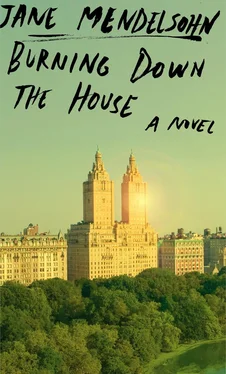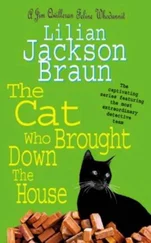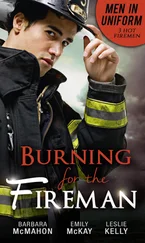Sure, he said pragmatically. First I have to invent a new substance. So light can reflect off of it in a new way.
Poppy sighed. Her face was expressionless, exhausted, but utterly beautiful, even more beautiful because she had no idea how beautiful she was in this moment. Her gigantic blue eyes gazed out through the window, over the townhouses, over the buildings, over the rivers, but saw nothing. She pressed her arms around Felix tightly. I wish I had hope like you do, she said.
He held on to her. His little face was stoic, unwavering.
It’s okay, he said.
No it isn’t, she said.
Yes it is, he said. It’s okay.
—
In the coming days Felix can tell that something is wrong, that Poppy seems to have slipped out of herself, into an artfully concealed madness that only he notices. He knows nothing about what’s been going on with Ian or about what has happened recently between them, but Felix senses some change, suspects something in Poppy’s air of strangeness, her manner of weird composure tilting into distraction and then teetering on the edge of performance. She is unusually, animatedly, interested in trivial concerns — what Felix had for breakfast, where Roman has misplaced his hockey stick — and detached from the issues that would normally merit her energetic response, such as an impossible-not-to-overhear argument between Patrizia and Steve vibrating from their bedroom while Poppy and the boys watch television in the entertainment room or the announcement that Jonathan and Miranda are going to have a baby. She’s become a spectator of her own life, as if it were an accident unfolding slowly before her eyes. Felix feels a terror taking over, but he can’t quite identify it. All he knows is that Poppy is in danger and that he is witnessing a profound unhappiness he has never before encountered. He tries to talk to her but she can’t keep up her end of the conversation. She goes off on tangents, non sequiturs, charming free-associative remarks that make him smile but also frighten him. He considers discussing this situation with an adult but is unsure if anyone would believe him. They have often dismissed his obscure ideas. The only person who seems a likely candidate for his confession is Neva, and she too is distracted, absorbed, although in a way that appears to him less dangerous than simply distanced. He would tell Neva if the right moment arose, but it hasn’t. They are always rushing to school, from school, to activities, from events, and the conversations they used to have are now less confidential, more perfunctory, businesslike. He thinks that being around his family has turned Neva into a businesswoman. And made Poppy go insane.
—
This is what she did, what it was like. She didn’t sleep at all or she slept until two in the afternoon, missing classes and pretending to be sick. She drank. She has never liked liquor but now when the house is empty — it is never entirely empty, there is always someone working, cleaning, rearranging, but when nobody is nearby — she opens the mirrored liquor cabinet and tries different drinks, based on their colors, their semiprecious hues. On the days she does leave the house to go to school she skips classes, takes the subway downtown or to Brooklyn, smokes cigarettes — she has never really enjoyed cigarettes — until they burn not only her fingertips but her lips. She sells quite a few of her most expensive clothes, for the feeling of selling her clothes. She goes out with friends and drinks and smokes cigarettes. At the same time! She thinks: Two things I hate but I am doing anyway! Actually three! She meets boys from other schools, boys she has never met before. And she meets men, the kind of men who are on the lookout for girls her age, or a little older, for she looks older when she gets dressed up to go out. She wears her hair messy, a tank top under some stylish blazer or sequined jacket that she will take off when she sits down before casually, immodestly reaching across the table, or the bar or the sofa if she is in a bar or a lounge or club with a sofa, and revealing her pretty lacy colorful bra beneath her tank top. She puts on sheer black tights or no stockings at all and when she does wear stockings there is usually a discreet rip someplace. She sports a tight skirt or leather pants. Her accessories telegraph that she has money, and her movements explain that she has knowledge. She is affectionate, especially with the girls with whom she travels. She slings her arms around them and they all lunge forward, laughing without really smiling. She rummages in her bag for another cigarette and spills credit cards on the floor and has to bend over to pick them up. She feels ridiculous but continues to behave this way. She thinks that this must be what it feels like to be a true teenager, that she is very successfully impersonating a teenager. She never really felt like one before, always wise beyond her years, or at least sophisticated if not wise, and now she has decided to be stupid, just the way she was supposed to be during high school while instead she was too busy being a snob to really play with the other kids, when she was too caught up in her sophisticated sadness to make a mess with them. Now she puts aside her eccentricities, her interests, her feelings, and chooses to drown with the others in an ultra-premium-vodka puddle, striped with shivering colored lights that make her think of fuel rods at Fukushima, a radioactive rainbow wriggling beneath her feet as she trips out of the restaurant onto the sidewalk into a waiting car. She dances with people who exist somewhere on a spectrum between friends and strangers, but not acquaintances, these nonrelationships feel more intense than that, something like estranged cousins reunited at the end of the world. That is what their revelry is most like, that of a merry band of distant relatives who have put aside their animosities, their petty differences, and even hatred, to join in a frenzied celebration on the last night of the universe or more likely the first night after the end, survivors gathered to remind themselves that they are alive. A writhing necklace of silhouetted figures joined in some macabre gavotte across the rooftops of the burned-out buildings and through the dusty abandoned parks of an uninhabitable, previously unimaginable, city.
—
When the psychiatrist had told her that they were all living post-apocalypse, Poppy hadn’t understood what that meant. Now she gets it. Poppy constructs her world in terms of pre-Ian and during-Ian and post-Ian and post-Ian is the same as post-apocalypse. This isn’t, she feels, necessarily a bad thing. It is an organizing principle and a time-management tool. And anyway she can’t really remember in her booze-fueled and pill-enhanced brain — yes, she has started to mix the two, an ingenious suggestion made by her latest private-equity semi-boyfriend — what life was like before or even during Ian. The blurry present annihilates all happy memories. But sometimes an image breaks through and she remembers a distant and shimmering good fortune — what must have been an ordinary moment at the time, a walk along the river with her mother that now takes on a pure brilliance. Light falling on the rippling Hudson in a cascade of transparency, a vivid nothingness sparkling silently and moving continuously and reflecting a meaning and mystery beyond naming. Her mother a presence beside her that stood for solace, consolation, the coalescence of everything safe. Poppy understands that this memory may just be a figment, a fantasy. But does it matter?
—
Where is Ian in her thoughts? He’s a figment too, a fantasy, already disintegrating like dissolving ice caps, floating wads of frozen lake separating, drifting apart, their melting patterns revealing memories trapped in memories now sliding into the sea of the past. This is going to be a slow process. She hears ice crack, echoing in an isolated valley. The reformation of her interior world. No sign yet of life in the cold water. No arctic flower seed fossilized under centuries of frost, waiting to be reborn. Not yet. Something — her soul? — trudges across the white landscape, her shadow spanning miles across the snow. A pale walking stick curved like the horn of a woolly mammoth plunges into the crisp powder. Footsteps, the thudding swish of an animal-skin cape, the walking stick breaking the surface, the inner warrior traveling through the inner landscape. The arctic flower buried at the icy peak of a distant mountain.
Читать дальше












